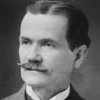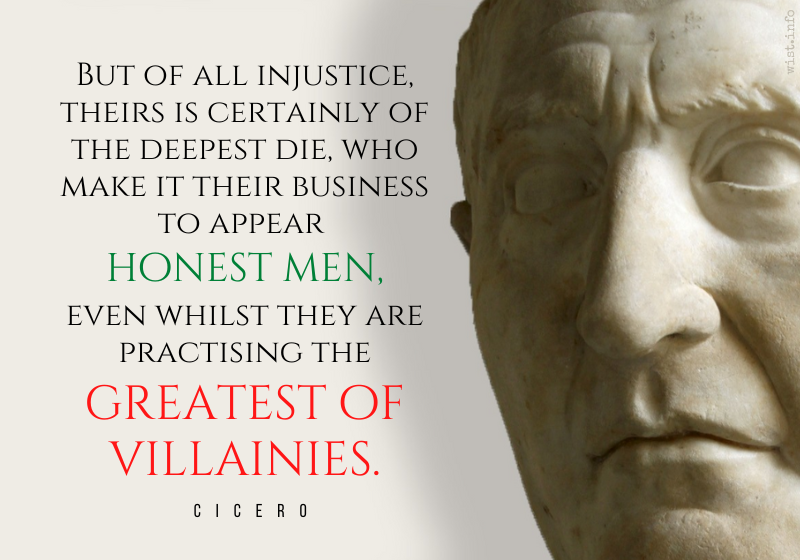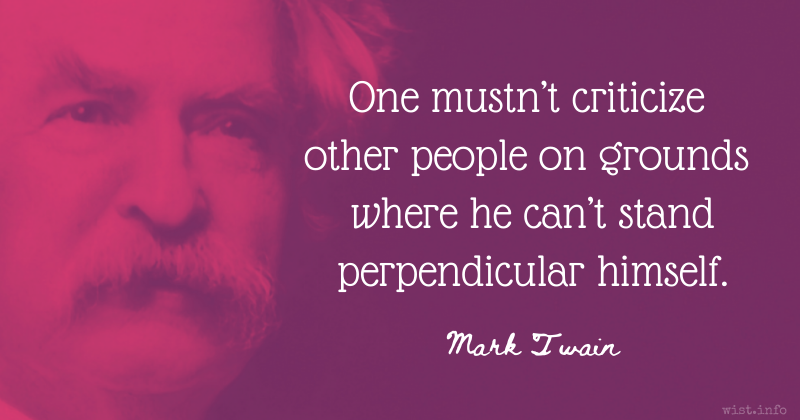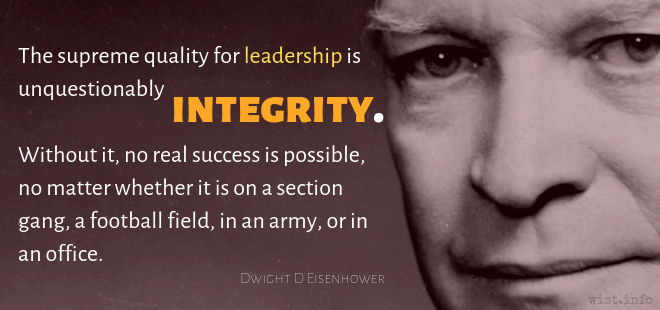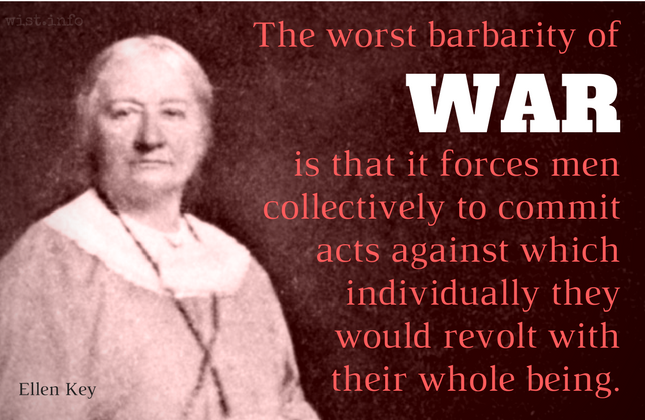A musician would not willingly consent that his lyre should be out of tune, nor a leader of a chorus that his chorus should not sing in the strictest possible harmony; but shall each individual person be at variance with himself, and shall he exhibit a life not at all in agreement with his words?
[εἶτα μουσικὸς μὲν οὐκ ἂν ἑκὼν δέξαιτο ἀνάρμοστον αὐτῷ τὴν λύραν εἶναι, καὶ χοροῦ κορυφαῖος μὴ ὅτι μάλιστα συνᾷάδοντα τὸν χορὸν ἔχειν” αὐτὸς δέ τίς ἕκαστος διαστασιάσει πρὸς ἑαυτόν, καὶ οὐχὶ τοῖς λόγοις ὁμολογοῦντα τὸν βίον παρέξεται.]
Basil of Caesarea (AD 330-378) Christian bishop, theologian, monasticist, Doctor of the Church [Saint Basil the Great, Ἅγιος Βασίλειος ὁ Μέγας]
Address to Young Men on Reading Greek Literature, ch. 6, sec. 4 [tr. Deferrari/McGuire (1933)]
(Source)
Quotations about:
hypocrisy
Note not all quotations have been tagged, so Search may find additional quotes on this topic.
The great majority of us are required to live a life of constant, systematic duplicity. Your health is bound to be affected if, day after day, you say the opposite of what you feel, if you grovel before what you dislike and rejoice at what brings you nothing but misfortune. Your nervous system isn’t a fiction, it’s a part of your physical body, and your soul exists in space and is inside you, like the teeth in your head. You can’t keep violating it with impunity.
Boris Pasternak (1890-1960) Russian poet, novelist, and literary translator
Doctor Zhivago [До́ктор Жива́го], Part 2, ch. 15 “Conclusion,” sec. 6 [Yury] (1955) [tr. Hayward & Harari (1958), UK ed.]
(Source)
Alternate translations:
The great majority of us are required to live a life of constant, systematic duplicity. Your health is bound to be affected if, day after day, you say the opposite of what you feel, if you grovel before what you dislike and rejoice at what brings you nothing but misfortune. Our nervous system isn’t just a fiction, it’s a part of our physical body, and our soul exists in space and is inside us, like the teeth in our mouth. It can’t be forever violated with impunity.
[tr. Hayward & Harari (1958), US ed.]
A constant, systematic dissembling is required of the vast majority of us. It’s impossible, without its affecting your health, to show yourself day after day contrary to what you feel, to lay yourself out for what you don’t love, to rejoice over what brings you misfortune. Our nervous system is not an empty sound, not a fiction. It’s a physical body made up of fibers. Our soul takes up room in space and sits inside us like the teeth in our mouth. It cannot be endlessly violated with impunity.
[tr. Pevear & Volokhonsky (2010)]
The objection to a scandal-monger is not that she tells of racy doings, but that she pretends to be indignant about them.
H. L. Mencken (1880-1956) American writer and journalist [Henry Lewis Mencken]
A Little Book in C Major, ch. 5, § 29 (1916)
(Source)
Altho’ thy Teacher act not as he preaches,
Yet ne’ertheless, if good, do what he teaches;
Good Counsel, failing Men may give; for why,
He that’s aground knows where the Shoal doth lie.
My old Friend Berryman, oft, when alive,
Taught others Thrift; himself could never thrive:
Thus like the Whetstone, many Men are wont
To sharpen others while themselves are blunt.Benjamin Franklin (1706-1790) American statesman, scientist, philosopher, aphorist
Poor Richard (1734 ed.)
(Source)
AGE, n. That period of life in which we compound for the vices that we still cherish by reviling those that we have no longer the enterprise to commit.
Ambrose Bierce (1842-1914?) American writer and journalist
“Age,” The Cynic’s Word Book (1906)
(Source)
Included in The Devil's Dictionary (1911).
Originally published in the "Devil's Dictionary" column in the San Francisco Wasp (1881-02-12).
So let’s be honest with ourselves and not take ourselves too serious, and never condemn the other fellow for doing what we are doing every day, only in a different way.
We smile at the women who are eagerly following the fashions in dress whilst we are as eagerly following the fashions in thought.
Austin O'Malley (1858-1932) American ophthalmologist, professor of literature, aphorist
Keystones of Thought (1914)
(Source)
Nothing enlarges more the Gulf of Atheism, than that Μέγα Χάσμα, wide passage, which lies between the Faith and Lives of Men pretending to be Christians.
Edward Stillingfleet (1635-1699) British Christian theologian, polemicist, preacher, prelate
Origines Sacræ, “The Epistle Dedicatory” (1663)
(Source)
The greatest single cause of atheism in the world today is Christians who acknowledge Jesus with their lips and walk out the door and deny Him by their lifestyle. That is what an unbelieving world simply finds unbelievable.
All men are frauds. The only difference between them is that some admit it. I myself deny it.
H. L. Mencken (1880-1956) American writer and journalist [Henry Lewis Mencken]
A Little Book in C Major, ch. 2, § 16 (1916)
(Source)
We want perfection in other people, and yet we do not put right our own failings. We want to see others firmly corrected, but we refuse correction ourselves. We take offence when permission is given to others, but we do not want our own requests refused. We want rules to check the activities of others, but we are indignant at restrictions on ourselves.
[Libenter videmus alios perfectos, sed tamen proprios non emendamus defectus. Volumus quod alii districte corrigantur, et nos ipsi corrigi nolumus, aut negari quod petimus. Alios restringi per statuta volumus, et ipsi nullatenus patimur amplius cohiberi.]
Thomas à Kempis (c. 1380-1471) German-Dutch priest, author
The Imitation of Christ [De Imitatione Christi], Book 1, ch. 16, v. 2ff (1.16.2-3) (c. 1418-27) [tr. Knott (1962)]
(Source)
(Source (Latin)). Alternate translations:
We would gladly have others perfect, but will not amend our own defaults. We would that others should be straitly corrected for their offences, but we will not be corrected. It misliketh us that others have liberty, but we will not be denied of that we ask. We would also that others should be restrained according to the statutes, but we in nowise will be restrained.
[tr. Whitford/Raynal (1530/1871)]
We would gladly have others perfect, yet we will not amend our own faults. We desire others to be strictly corrected for their offenses, yet we will not be corrected. We dislike it that others have liberty, yet we will not be denied what we ask. We desire that others should be restrained according to the laws, yet we will in no way be restrained.
[tr. Whitford/Gardiner (1530/1955)]
It is injustice to expect that in another which thou hast not in thy self, to looke for perfection in others, and yet not to amend imperfections in our selves. We will have others severely punisht, and will not amend our selves; the large liberty of others disliketh us, and yet we will not have our desires deni'd us, we will have rigorous Lawes imposed upon others, but in no sort will we our selves be restrained.
[tr. Page (1639), 1.16.8-9]
And, indeed, nothing is more common, than to express exceeding Zeal in amending our Neighbours, and mighty Indignation against Their Vices or Imperfections, while at the same time we neglect the beginning at Home, and either quite overlook, or seem highly contented with our own. We set up for Reformers, declaim at the Wickendess of the Age, and are all for suppressing and punishing it by vigorous Laws; and yet are unwilling that any Check or Restraint should be put upon our own Freedoms.
[tr. Stanhope (1696; 1706 ed.)]
But we require perfection in the rest of mankind, and take no care to rectify the disorders of our own heart; we desire that the faults of others should be severely punished, and refuse the gentlest correction ourselves; we are offended at their licentiousness, and yet cannot bear the least opposition to our own immoderate desires. We would subject all to the control of rigorous statute and penal laws, but will not suffer any restraint upon our own actions.
[tr. Payne (1803), 1.16.3]
We would willingly have others perfect, and yet we amend not our own faults. We will have others severely corrected, and will not be corrected ourselves. The large liberty of others displeaseth us; and yet we will not have our own desires denied us. We will have others kept under by strict laws; but in no sort will ourselves be restrained.
[ed. Parker (1841)]
We willingly require perfection in the rest of mankind, and yet do not rectify the disorders of our own hearts. We desire that the faults of others should be severely punished, and refuse the gentlest correction ourselves. We are offended at their licentiousness, and yet cannot bear the least denial of our own immoderate desires. We would subject all to the control of rigorous statutes, but suffer no restraint upon our own action.
[tr. Dibdin (1851)]
We would fain have others perfect, and yet we amend not our own defects. We would have others strictly corrected, but will not be corrected ourselves. The large liberty of others displeases us, and yet we would not be denied anything we ask for. We wish others to be bound down by laws, and we suffer ourselves to be in no sort restrained.
[ed. Bagster (1860)]
We are ready to see others made perfect, and yet we do not amend our own shortcomings. We will that others be straitly corrected, but we will not be corrected ourselves. The freedom of others displeaseth us, but we are dissatisfied that our own wishes shall be denied us. We desire rules to be made restraining others, but by no means will we suffer ourselves to be restrained.
[tr. Benham (1874)]
We are desirous to have others perfect, and yet we amend not our own faults. We will have others severely corrected, and will not be corrected ourselves. The large liberty of others displeaseth us; and yet we will not have our own desires denied us. We will have others kept under by strict laws; but in no sort will we ourselves be restrained.
[tr. Anon. (1901)]
We want them to be perfect, yet we do not correct our own faults. We wish them to be severely corrected, yet we will not correct ourselves. Their great liberty displeases us, yet we would not be denied what we ask. We would have them bound by laws, yet we will allow ourselves to be restrained in nothing.
[tr. Croft/Bolton (1940)]
We would readily have others perfect and yet not amend our own defects. We want others rigidly corrected and are unwilling to be corrected ourselves. The wide freedom of others displeases us, and yet we would not be denied whatever we ask. We wish others to be bound by rules, and will ourselves in no way be held in.
[tr. Daplyn (1952)]
For we require other people to be perfect, but do not correct our own faults. We wish to see others severely reprimanded; yet we are unwilling to be corrected ourselves. We wish to restrict the liberty of others, but are not willing to be denied anything ourselves. We wish others to be bound by rules, yet we will not let ourselves be bound.
[tr. Sherley-Price (1952)]
We like to have everybody around us quite perfect, but our own faults -- we never seem to correct them. Tom, Dick and Harry must be strictly called to order, but we aren't fond of being called to order ourselves. It is always the other man that has too much rope given him -- our wishes must not be thwarted; rules for everybody else, but our own liberties must not be abridged for a moment.
[tr. Knox-Oakley (1959), 1.16.3]
Though quick to expect perfection in others, we take little care to correct our own shortcomings. We wouidl have others strictly corrected, but not ourselves. The wide freedom of others displeases us, yet we wish to be denied nothing that we ourselves desire. We would have others under the restraint of the rule while unwilling ourselves to be under any sort of restraint.
[tr. Rooney (1979)]
We would willingly have others be perfect, and yet we fail to correct our own faults. We want others to be strictly corrected, and yet we are unwilling to be corrected ourselves. Other peoples' far-ranging freedom annoys us, and yet we insist on having our own way. We wish others to be tied down by rules, and yet we will not allow ourselves to be held in check in any way at all.
[tr. Creasy (1989)]
The last few days I have read various addresses made on Lincoln’s Birthday. Every Politician always talks about him, but none of them ever imitate him.
We must not allow Negroes to be men, lest we ourselves should be suspected of not being Christians.
Charles-Lewis de Secondat, Baron de Montesquieu (1689-1755) French political philosopher
The Spirit of Laws [De l’esprit des lois], Vol. 1, Book 15, ch. 5 (1748)
In a satirical set of justifications for slavery of Africans (an institution Montesquieu generally condemned).
This form of the phrase was commonly used by American abolitionists, e.g., used as an epigram in Lydia Maria Child, An Appeal in Favor of That Class of Americans Called Africans, ch. 6 (1836).
French original text:
Il est impossible que nous supposions que ces gens-là soient des hommes, parce que, si nous les supposions des hommes, on commencerait à croire que nous ne sommes pas nous-mêmes chrétiens.
Alternate translations:
It is impossible for us to suppose these creatures to be men, because allowing them to be men, a suspicion would follow, that we ourselves are not Christians.
[tr. Nugent (1758 ed.)]
It is impossible for us to assume that these people are men because if we assumed they were men one would begin to believe that we ourselves were not Christians.
[tr. Cohler/Miller/Stone (1989)]
But although tact is a virtue, it is very closely allied to certain vices; the line between tact and hypocrisy is a very narrow one. I think the distinction comes in the motive: when it is kindliness that makes us wish to please, our tact is the right sort; when it is fear of offending, or desire to obtain some advantage by flattery, our tact is apt to be of a less amiable kind.
Bertrand Russell (1872-1970) English mathematician and philosopher
“On Tact,” New York American (1933-02-01)
(Source)
Whereas I formerly believed it to be my bounden duty to call others to order, I must now admit that I need calling to order myself, and that I would do better to set my own house to rights first.
Carl Jung (1875-1961) Swiss psychologist
“The Spiritual Problem of Modern Man,” ¶ 162 (1928)
(Source)
Fraud, which so gnaweth at all men’s conscience,
A man may use on one who trusts him best
And on him also who risks no confidence.
This latter mode seems only to arrest
The love which Nature meaneth to endure;
Hence in the second circle huddled nest
Hypocrisy, flattery; they who would conjure
By spells; and simony; the thief, the cheat,
Pandars and barrators, and the like ordure.[La frode, ond’ogne coscïenza è morsa,
può l’omo usare in colui che ‘n lui fida
e in quel che fidanza non imborsa.
Questo modo di retro par ch’incida
pur lo vinco d’amor che fa natura;
onde nel cerchio secondo s’annida
ipocresia, lusinghe e chi affattura,
falsità, ladroneccio e simonia,
ruffian, baratti e simile lordura.]Dante Alighieri (1265-1321) Italian poet
The Divine Comedy [Divina Commedia], Book 1 “Inferno,” Canto 11, l. 52ff (11.52-60) [Virgil] (1309) [tr. Binyon (1943)]
(Source)
On the punishment of common fraudsters, who do not betray a personal trust but only the natural love of humanity. This is still deemed worse, in Dante's cosmology, than deadly "bestial" violence.
Barratry is the sale of justice, employment, or public offices, going alongside simony, the sale of holy offices.
(Source (Italian)). Alternate translations:
That Fraud of which each Conscience feels the pangs
Man may commit 'gainst those who do confide
In him, as well as those who trust him not.
The first unhappily destroys the Bond
In general by Nature form'd: from whence
Confined in the second Circle are
The Hypocrites, the Flatterers, and they
Who practice Coz'ning, Sorcery, and Theft,
Base Simony, procuring with a smile,
Masked Deceit, and all such filthy tricks.
[tr. Rogers (1782), l. 53ff]
Fraud skulks below with all her various brood,
There darkling dwell the foes of public good.
The pilf'rer, and the cheat, his dark ally:
With those, whose felon hand their trust betray'd,
Hypocrisy in faintly garb array'd.
Corruption foul, and frontless Perjury.
[tr. Boyd (1802), st. 8]
Fraud, that in every conscience leaves a sting,
May be by man employ’d on one, whose trust
He wins, or on another who withholds
Strict confidence. Seems as the latter way
Broke but the bond of love which Nature makes.
Whence in the second circle have their nest
Dissimulation, witchcraft, flatteries,
Theft, falsehood, simony, all who seduce
To lust, or set their honesty at pawn,
With such vile scum as these.
[tr. Cary (1814)]
Fraud, to the stricken conscience inly known,
Might man devise on him who faith disbursed,
And eke on him who credence had not shown.
The bond of love which nature framed at first.
But only that, the latter mode hath slain,
Whence nesting in the second orb lie curst
Hypocrites, and flatterers, and the wizard train,
Falseness, and simonies, and pilferers' trade,
Panders, and cheats, and all of foulest stain.
[tr. Dayman (1843)]
Fraud, which gnaws every conscience, a man may practice upon one who confides in him; and upon him who reposes no confidence.
This latter mode seems only to cut off the bond of love which Nature makes: hence in the second circle nests
hypocrisy, flattery, sorcerers, cheating, theft and simony, pandars, barrators, and like filth.
[tr. Carlyle (1849)]
And fraud, that every conscience can corrode --
Fraud may be practiced against them who trust,
And those who put no confidence in dust.
This seems to come behind, it only slays
The kindly chains of love that nature binds
Hence, in the lower circle, station finds
Hypocrisy, flattery and sorcery;
Falsification, robbery, simony,
Seduction, quarrels, and brutality.
[tr. Bannerman (1850)]
That fraud, which sharply, ev'ry conscience bites,
Man against those who trust in him may use,
Or against those by whom no trust is giv'n.
This latter seems to rend in twain the bond
Which Nature in her love for us hath made;
Whence in the second circle such are held;
Magic, hypocrisy, and flatters,
Vile falsehood, robbery and simony,
Panders and Userers, and such foul stuff.
[tr. Johnston (1867)]
Fraud, wherewithal is every conscience stung,
A man may practise upon him who trusts,
And him who doth no confidence imburse.
This latter mode, it would appear, dissevers
Only the bond of love which Nature makes;
Wherefore within the second circle nestle
Hypocrisy, flattery, and who deals in magic,
Falsification, theft, and simony,
Panders, and barrators, and the like filth.
[tr. Longfellow (1867)]
The fraud, wherewith every conscience is pricked, man can practise towards the one who trusts him, and towards him who has no confidence in store. This latter mode seems to destroy only the bond of love that nature makes; whence in the second circle have their nests hypocrisy, flatteries, and whoso uses arts; forgery, robbery, and simony; pandars, jobbers, and suchlike filth.
[tr. Butler (1885)]
Such fraud, for which all must compunction feel.
Can man exert 'gainst him whose trust he shares,
And him whose thoughts no confidence reveal.
This latter fashion all unseemly tears
The golden chain of love which Nature weaves.
Whence gather in the second circle's lairs
Hypocrisy, all flattery that deceives,
Witchcraft, lies, thefts, the Simoniac blot.
Panders, chicaners, and all similar thieves.
[tr. Minchin (1885)]
Fraud, by which every conscience is bitten, man may practice on one that confides in him, or on one that owns no confidence. This latter mode seemeth to destroy only the bond of love that nature makes; wherefore in the second circle nestle hypocrisy, flatteries, and sorcerers, falsity, robbery, and simony, panders, barrators, and such like filth.
[tr. Norton (1892)]
Fraud, with which there is no conscience but is bitten, a man may practise upon one who putteth his trust in him; and upon one who giveth no credit for fidelity. This last kind seemeth only to sever the bond of love which nature weaveth; and therefore is it that in the second circle there nestle hypocrisy, flattery, workers of sorcery, treachery, robbery and simony, panders, barrators, and such-like refuse.
[tr. Sullivan (1893)]
Fraud, wherewithal is bitten every conscience,
A man may use regarding one who trusts him,
Or one who has no store of trust to deal with.
This latter way, as it would seem, slays only
The tie of love that nature itself fashions;
Whence make their nest within the second circle
Hypocrisy, smooth speeches, and bewitchment,
Forgery, thieving, and the sin of Simon,
Panders, and jobbers, and the like offscouring.
[tr. Griffith (1908)]
Fraud, which always stings the conscience, a man may practice on one who confides in him or on one who does not so place his confidence; it is evident that this latter way destroys simply the bond of love which nature makes, so that in the next circle, hypocrisy, flatteries, sorceries, falsifications, theft, and simony, panders, jobbers, and like filth have their nest.
[tr. Sinclair (1939)]
Fraud, which gnaws at every conscience, may be a breach
Of trust against the confiding, or deceive
Such as repose no confidence; though each
Is fraud, the latter sort seems but to cleave
The general bond of love and Nature's tie;
So the second circle opens to receive
Hypocrites, flatterers, dealers in sorcery,
Panders and cheats, and all such filthy stuff,
With theft, and simony and barratry.
[tr. Sayers (1949)]
Fraud, which is a canker to every conscience,
may be practiced by a man on those who trust him,
and on those who have reposed no confidence.
This latter mode seems only to deny
the bond of love which all men have from Nature;
therefore within the second circle lie
simoniacs, sycophants, and hypocrites,
falsifiers, thieves, and sorcerers,
grafters, pimps, and all such filthy cheats.
[tr. Ciardi (1954)]
Fraud, which gnaws at every conscience, a man may practice upon one who trusts in him, or upon one who reposes no condifence. This altter way seems to sever only the bond of love which nature makes; wherefore in the second circle hypocrisy, flatteries, sorcerers, falsity, theft, simony, panders, barratry, and like filth have their nest.
[tr. Singleton (1970)]
Fraud, that gnaws the conscience of its servants,
can be used on one who puts his trust in you
or else on one who has no trust invested.
This latter sort seems only to destroy
the bond of love that Nature gives to man;
so in the second circle there are nests
of hypocrites, flatterers, dabblers in sorcery,
falsifiers, thieves and simonists,
panders, seducers, grafters and like filth.
[tr. Musa (1971)]
Now fraud, that eats away at every conscience,
is praticed by a man against another
who trusts in him, or one who has no trust.
This latter way seems only to cut off
the bond of love that nature forges; thus,
nestled within the second circle are:
hypocrisy and flattery, sorcerers,
and falsifiers, simony, and theft,
and barrators and panders and like trash.
[tr. Mandelbaum (1980)]
Fraud, by which every conscience is bitten,
A man may practice on a person who trusts him
Or upon one who has no confidence in him.
This latter mode cuts only the bond of love
Which nature itself establishes;
And so there are, lodged in the second circle,
Hypocrisy, flatterers, and those who delude,
Falsity, thieving and simony,
Pimps, trouble-makers, and all such-like scum.
[tr. Sisson (1981)]
Fraud, which bites every conscience, a man may play
Either on one who trusts him, or one who does not.
The latter of the two is seen to destroy
Only those bonds of love that nature makes:
So in the second circle hypocrisy,
Flatterers, sorcery, larceny, simoniacs,
With pimps, barrators, and such filth have their nest.
[tr. Pinsky (1994), ll. 53-59]
Fraud, which bites at every mind, a man can use against one who trusts in him or against one who has in his purse no cause for trust.
This latter mode seems to cut solely into the bond of love that Nature makes; thus in the second circle find their nest
hypocrisy, flattery, casters of spells, impersonators, thievery and simony, panders, embezzlers, and similar filth.
[tr. Durling (1996)]
Human beings may practise deceit, which gnaws at every conscience, on one who trusts them, or on one who places no trust. This latter form of fraud only severs the bond of love that Nature created, and so, in the eighth circle, are nested hypocrisy; sorcery; flattery; cheating; theft and selling of holy orders; pimps; corrupters of public office; and similar filth.
[tr. Kline (2002)]
As for deceit -- which gnaws all rational minds --
we practise this on those who trust in us,
or those whose pockets have no room for trust.
Fraud of the second kind will only gash
the ligature of love that Nature forms:
and therefore in great Circle Two there nests
smarm and hypocrisy, the casting-up of spells,
impersonation, thievery, crooked priests,
embezzlement and pimping, such like scum.
[tr. Kirkpatrick (2006)]
Fraud gnaws at every conscience,
whether used on him who trusted
or on one who lacked such faith.
Fraud against the latter only severs
the bond of love that nature makes.
Thus in the second circle nest
hypocrisy, flatteries, and sorcerers;
lies, theft, and simony;
panders, barrators, and all such filth.[tr. Hollander/Hollander (2007)]
Fraud will gnaw at the conscience, but a man may bury
His heart and cheat the people who believe in him --
But trust's not needed, just opportunity.
This sinning slices away the soft-tied tether
Of love, prepared for us by Nature. The second
Circle is therefore a nest for flatterers
And hypocrites and liars, and those who press
Illiterate fools for high Church office, well-paid
For their filthy work, and bawds, and all such festering
Sores.
[tr. Raffel (2010)]
Fraud eats the conscience, whether used against
Those who trust us, or those who trust us not.
In the latter case, the bonds of love dispensed
By nature are undone. Thus you have got,
In Circle Eight, toadies and hypocrites,
Magicians, forgers, thieves, thugs, dealers in
Holy preferment, everything that fits
The definition of sheer filth.
[tr. James (2013)]
Well, we cuss the lawmakers. But I notice we’re always perfectly willin’ to share in any of the sums of money that they might distribute.
Hypocrisy is the tribute that vice pays to virtue.
[L’hypocrisie est un hommage que le vice rend à la vertu.]
François VI, duc de La Rochefoucauld (1613-1680) French epigrammatist, memoirist, noble
Réflexions ou sentences et maximes morales [Maxims], ¶ 218 (1665-1678) [tr. FitzGibbon (1957)]
(Source)
(Source (French)). Alternate translations:
Hypocrisie is a Sort of Homage which Vice pays to Vertue.
[tr. Stanhope (1694), ¶ 219]
Hypocrisy is the homage that vice pays to virtue.
[pub. Donaldson (1783), ¶ 231; ed. Lepoittevin-Lacroix (1797), ¶ 209; ed. Carville (1835), ¶ 449; tr. Bund/Friswell (1871), ¶ 218]
Hypocrisy is the homage that vice renders to virtue.
[ed. Gowens (1851), ¶ 227]
Hypocrisy is a tribute vice pays to virtue.
[tr. Heard (1917), ¶ 223; tr Tancock (1959), ¶ 218]
Hypocrisy is a sort of homage which vice pays to virtue.
[tr. Stevens (1939), ¶ 218]
Hypocrisy is the homage vice offers to virtue.
[tr. Kronenberger (1959), ¶ 218]
Hypocrisy is a form of homage that vice pays to virtue.
[tr. Whichello (2016), ¶ 218]
All the higher animals have methods of expressing pleasure, but human beings alone express pleasure when they do not feel it. This is called politeness and is reckoned among the virtues.
Bertrand Russell (1872-1970) English mathematician and philosopher
“On smiling,” New York American (1932-08-17)
(Source)
This Sir, was a time in which you clearly saw into the injustice of a State of Slavery, and in which you had just apprehensions of the horrors of its condition, it was now Sir, that your abhorrence thereof was so excited, that you publickly held forth this true and invaluable doctrine, which is worthy to be recorded and remember’d in all Succeeding ages. “We hold these truths to be Self evident, that all men are created equal, and that they are endowed by their creator with certain unalienable rights, that among these are life, liberty, and the pursuit of happyness.”
Here Sir, was a time in which your tender feelings for your selves had engaged you thus to declare, you were then impressed with proper ideas of the great valuation of liberty, and the free possession of those blessings to which you were entitled by nature; but Sir how pitiable is it to reflect, that altho you were so fully convinced of the benevolence of the Father of mankind, and of his equal and impartial distribution of those rights and privileges which he had conferred upon them, that you should at the Same time counteract his mercies, in detaining by fraud and violence so numerous a part of my brethren under groaning captivity and cruel oppression, that you should at the Same time be found guilty of that most criminal act, which you professedly detested in others, with respect to yourselves.
Benjamin Banneker (1731-1806) American naturalist, surveyor, almanac author, mathematician
Letter to Thomas Jefferson (19 Aug 1791)
(Source)
A man who parades his piety is one who, under an atheist king, would be an atheist.
[Un dévot est celui qui, sous un roi athée, serait athée.]
Jean de La Bruyère (1645-1696) French essayist, moralist
The Characters [Les Caractères], ch. 13 “Of the Fashion [De la Mode],” § 21 (13.21) (1688)
(Source)
La Bruyère notes in the original this refers to a "faux dévot."
(Source (French)). Alternate translations:
An Hypocrite is one that will be an Atheist under a King that is so.
[Bullord ed. (1696)]
A Devote is one, that under a King who was an Atheist, would be a Devote.
[Curll ed. (1713)]
A Devoto is one, that under an atheistical King wouild be an Atheist.
[Browne ed. (1752)]
A pious person is one who, under an atheistical king, would be an atheist.
[tr. Van Laun (1885)]
A pious hypocrite is one who, under an atheistic king, would be an atheist.
[tr. Stewart (1970)]
I have often wondered, that persons who make a boast of professing the Christian religion, namely, love, joy, peace, temperance, and charity to all men, should quarrel with such rancorous animosity, and display daily towards one another such bitter hatred, that this, rather than the virtues they claim, is the readiest criterion of their faith.
Baruch Spinoza (1632-1677) Dutch philosopher
Theological-Political Treatise [Tractatus Theologico-Politicus], Part 1, Preface, sec. 23 (1670)
(Source)
But of all injustice, theirs is certainly of the deepest die, who make it their business to appear honest men, even whilst they are practising the greatest of villainies.
[Totius autem iniustitiae nulla capitalior quam eorum, qui tum, cum maxime fallunt, id agunt, ut viri boni esse videantur.]
Marcus Tullius Cicero (106-43 BC) Roman orator, statesman, philosopher
De Officiis [On Duties; On Moral Duty; The Offices], Book 1, ch. 13 (1.13) / sec. 41 (44 BC) [tr. Cockman (1699)]
(Source)
(Source (Latin)). Alternate translations:
No act of injustice is more pernicious than theirs, who while they are attempting the greatest deceit, labor to appear good men.
[tr. McCartney (1798)]
But in the whole system of villainy, none is more capital than that of the men, who, when they most deceive, so manage as that they may seem to be virtuous men.
[tr. Edmonds (1865)]
But of all forms of injustice, none is more heinous than that of the men who, while they practise fraud to the utmost of their ability, do it in such a way that they appear to be good men.
[tr. Peabody (1883)]
The most criminal injustice is that of the hypocrite who hides an act of treachery under the cloak of virtue.
[tr. Gardiner (1899)]
No iniquity is more deadly than that of those who, when they are most at fault, so behave as to seem men of integrity.
[ed. Harbottle (1906)]
But of all forms of injustice, none is more flagrant than that of the hypocrite who, at the very moment when he is most false, makes it his business to appear virtuous.
[tr. Miller (1913)]
Taking all forms of injustice into account, none is more deadly than that practiced by people who act as if they are good men when they are being most treacherous.
[tr. Edinger (1974)]
Vices can be elevated, but are always base. Some people see a certain hero with a certain fault, but they don’t realize it wasn’t the fault that made him a hero. An example of people in high places is so persuasive that it makes people imitate even their ugliness. Adulation mimics even an ugly face, without realizing that what is hidden by greatness is abominated when greatness is lacking.
[Bien pueden estar los vicios realzados, pero no son realces. Ven algunos que aquel héroe tuvo aquel accidente, pero no ven que no fue héroe por aquello. Es tan retórico el ejemplo superior, que aun las fealdades persuade; hasta las del rostro afectó tal vez la lisonja, no advirtiendo que, si en la grandeza se disimulan, en la bajeza se abominan.]
Baltasar Gracián y Morales (1601-1658) Spanish Jesuit priest, writer, philosopher
The Art of Worldly Wisdom [Oráculo Manual y Arte de Prudencia], § 186 (1647) [tr. Maurer (1992)]
(Source)
(Source (Spanish)). Alternate translation:
Vices may very well be exalted, but not exalt. Some observe, that such a Heroe hath had such a Vice, but they consider not, that it was not that Vice which made him a Heroe. The example of great men is so good an Oratour, that it persuades one to infamous matters. Sometimes flattery hath affected even bodily defects, without observing, that though they be born with in great men, they are insupportable in the mean.
[Flesher ed. (1685)]
Vices may stand in high place, but are low for all that. Men can see that many a great man has great faults, yet they do not see that he is not great because of them. The example of the great is so specious that it even glosses over viciousness, till it may so affect those who flatter it that they do not notice that what they gloss over in the great they abominate in the lower classes.
[tr. Jacobs (1892)]
The vices may stand high, but they are not high: some see a great man afflicted with this vice or that; but they do not see, that is great not because of it but in spite of it. The portrait of the man high up is so convincing, that even his deformities persuade, wherefore flattery at times mimics them, not seeing, that if in the great such things are overlooked, in the small, they are looked down upon.
[tr. Fischer (1937)]
POLITENESS, n. The most acceptable hypocrisy.
It is the people with secret attractions to various temptations who busy themselves most with removing those temptations from other people; really they are defending themselves under the pretext of defending others, because at heart they fear their own weakness.
Ernest Jones (1879-1958) Welsh neurologist and psychoanalyst
“Criticisms of Psycho-Analytic Treatment,” Speech, Chicago Neurological and Chicago Medical Societies (18 Jan 1911)
Originally published in the American Journal of the Medical Sciences (Jul 1911). Reprinted in Papers on Psycho-Analysis, ch. 12 (1918).
People are egregiously mistaken if they think they ever can attain to permanent popularity by hypocrisy, by mere outside appearances, and by disguising not only their language but their looks. True popularity takes deep root and spreads itself wide; but the false falls away like blossoms; for nothing that is false can be lasting.
[Quodsi qui simulatione et inani ostentatione et ficto non modo sermone, sed etiam voltu stabilem se gloriam consequi posse rentur, vehementer errant. Vera gloria radices agit atque etiam propagatur, ficta omnia celeriter tamquam flosculi decidunt, nee simulatum potest quicquam esse diuturnum.]
Marcus Tullius Cicero (106-43 BC) Roman orator, statesman, philosopher
De Officiis [On Duties; On Moral Duty; The Offices], Book 2, ch. 12 (2.12) / sec. 43 (44 BC) [tr. Edmonds (1865)]
(Source)
(Source (Latin)). Alternate translation:
Those people therefore are highly mistaken, who think of obtaining a solid reputation by vain shows and hypocritical pretences; by composed countenances and studied forms of words: for true glory takes deep root, and grows and flourishes more and more; but that which is only in show and mere outside, quickly decays and withers like flowers; nor can anything be lasting that is only counterfeit.
[tr. Cockman (1699)]
But if any suppose, that they can obtain a stable reputation by pretences, empty ostentation, hypocritical conversation, and even artificial looks, they are extremely mistaken. True fame takes deep root, and extends its shoots. Every counterfeit appearance, like blossoms, quickly falls off; and no pretense can be lasting.
[tr. McCartney (1798)]
If there be those who think to obtain enduring fame by dissembling and empty show, and by hypocrisy, not only of speech, but of countenance also, they are utterly mistaken. True fame strikes its roots downward, and sends out fresh shoots; all figments fall speedily, like blossoms, nor can anything feigned be lasting.
[tr. Peabody (1883)]
It is a delusion to suppose that glory can be founded on dissimulation, vain ostentation, and studied words and looks. True glory strikes root and spreads, everything unreal soon falls like the blossoms, a lie cannot last.
[tr. Gardiner (1899)]
True glory strikes roots, and grows: ill-founded reputations, like flowers, soon wither, nor can anything last long which is based on pretence.
[ed. Harbottle (1906)]
For if anyone thinks that he can win lasting glory by pretence, by empty show, by hypocritical talk and looks, he is very much mistaken. True glory strikes deep root and spreads its branches wide; but all pretences soon fall to the ground like fragile flowers, and nothing counterfeit can be lasting.
[tr. Miller (1913)]
If anyone thinks he can attain lasting glory by mimicry, by empty shows, by pretense in his looks and his conversation, he is far from correct. Genuine glory puts down roots and even sends out new growth; any pretense dies down quickly, like fragile flowers. Nothing simulated can be long-lasting.
[tr. Edinger (1974)]
Because we have sought to cover up past evil, though it still persists, we have been powerless to check the new evil of today. Evil unchecked grows, evil tolerated poisons the whole system. And because we have tolerated our past and present evils, international affairs are poisoned and law and justice have disappeared from them.
Jawaharlal Nehru (1889-1964) Indian nationalist leader, politician, statesman, author
“The Bombing of Open Towns,” speech, International Peace Campaign Conference, Paris (24 Jul 1938)
(Source)
Nehru was comparing rising fascism to colonial imperialism, and the bombings of cities in Spain and China to ongoing British bombing of villages in the North-West Frontier of India. Collected in The Unity of India : Collected Writings, 1937-1940 (1942).
All the Sixties were complicated, you know. On the one hand it was funny too, you know; on the other hand it was cruel, you know. The Communists are so cruel, because they impose one taste on everybody, on everything, and who doesn’t comply with their teachings and with their ideology, is very soon labeled pervert, you know, or whatever they want you call it, or counterrevolutionary or whatever. And then the censorship itself, that’s not the worst evil. The worst evil is — and that’s the product of censorship — is the self-censorship, because that twists spines, that destroys my character because I have to think something else and say something else, I have to always control myself. I am stopping to being honest, I am becoming hypocrite — and that’s what they wanted, they wanted everybody to feel guilty, they were, you know… And also they were absolutely brilliant in one way, you know: they knew how effective is not to punish somebody who is guilty; what Communist Party members could afford to do was mind-boggling: they could do practically anything they wanted — steal, you know, lie, whatever. What was important — that they punished if you’re innocent, because that puts everybody, you know, puts fear in everybody.
Jan Tomáš "Miloš" Forman (1932-2018) Czech-American film director, screenwriter, actor, academic
National Security Archive interview (18 Jan 1997)
(Source)
What is blasphemy? I will give you a definition; I will give you my thought upon this subject. What is real blasphemy?
To live on the unpaid labor of other men — that is blasphemy.
To enslave your fellow-man, to put chains upon his body — that is blasphemy.
To enslave the minds of men, to put manacles upon the brain, padlocks upon the lips — that is blasphemy.
To deny what you believe to be true, to admit to be true what you believe to be a lie — that is blasphemy.
To strike the weak and unprotected, in order that you may gain the applause of the ignorant and superstitious mob — that is blasphemy.
To persecute the intelligent few, at the command of the ignorant many — that is blasphemy.
To forge chains, to build dungeons, for your honest fellow-men — that is blasphemy.
To pollute the souls of children with the dogma of eternal pain — that is blasphemy.
To violate your conscience — that is blasphemy.
The jury that gives an unjust verdict, and the judge who pronounces an unjust sentence, are blasphemers.
The man who bows to public opinion against his better judgment and against his honest conviction, is a blasphemer.
Robert Green Ingersoll (1833-1899) American lawyer, agnostic, orator
Speech to the Jury, Trial of C. B. Reynolds for Blasphemy, Morristown, New Jersey (May 1887)
(Source)
By force you can make hypocrites — men who will agree with you from the teeth out, and in their hearts hate you. We want no more hypocrites. We have enough in every community. And how are you going to keep from having more? By having the air free, — by wiping from your statute books such miserable and infamous laws as this.
Robert Green Ingersoll (1833-1899) American lawyer, agnostic, orator
Speech to the Jury, Trial of C. B. Reynolds for Blasphemy, Morristown, New Jersey (May 1887)
(Source)
Preacher preaching love like vengeance
Preaching love like hate
Calling for large donations
Promising estates
Rolling lawns and angel bands
Behind the pearly gates
You know he will have his in this life
But yours will have to wait
He’s immaculately tax freeJoni Mitchell (b. 1943) Canadian singer-songwriter and painter [b. Roberta Joan Anderson]
“Tax Free” Joni Mitchell (1985)
(Source)
The best way to know our faults is to notice which ones you accuse others of.
James Richardson (b. 1950) American poet
Vectors: Aphorisms and Ten-Second Essays, #195 (2001)
(Source)
People may see hypocrisy and cynicism all around them, but in my experience, almost without exception, they believe their own views and actions — even when contradictory, even when private motivations differ from public explanations — are righteous and principled.
John F. Harris (b. c. 1963) American political journalist, editor
“‘He Is Our O.J.'” Politico (9 Jan 2020)
(Source)
For if justice be a virtue, it must be free from the imputation of crime, and not return evil for evil. For what kind of virtue is it for you to do yourself what you punish in another? This is merely to propagate iniquity, not to punish it; and the character of the person whom you injure, whether he be just or unjust, makes no difference, for you ought not to have done evil.
Ambrose of Milan (339-397) Roman theologian, statesman, Christian prelate, saint, Doctor of the Church [Aurelius Ambrosius]
Letter to the Church of Vercellae, para. 83
(Source)
How few philosophers are to be found who are such in character, so ordered in soul and in life, as reason demands; who regard their teaching not as a display of knowledge, but as the rule of life; who obey themselves, and submit to their own decrees!
[Quotus enim quisque philosophorum invenitur, qui sit ita moratus, ita animo ac vita constitutus, ut ratio postulat? qui disciplinam suam non ostentationem scientiae, sed legem vitae putet? qui obtemperet ipse sibi et decretis suis pareat?]
Marcus Tullius Cicero (106-43 BC) Roman orator, statesman, philosopher
Tusculan Disputations [Tusculanae Disputationes], Book 2, ch. 4 (2.4) / sec. 11 [Marcus] (45 BC) [tr. Peabody (1886)]
(Source)
Original Latin. Alternate translations:
For where is there one Philosopher of a thousand to be found, of such a Temper and Conversation, as Reason requires? who maketh use of his Doctrine not for Ostentation of Knowledge, but a Rule of Life? who believes himself, and observes his own Precepts?
[tr. Wase (1643)]
For how few philosophers will you meet with, whose life and manners are conformable to the dictates of reason? who look on their profession, not as a means of displaying their learning, but as a rule for their practice? who follow their own precepts, and comply with their own decrees?
[tr. Main (1824)]For, how rare to find a philosopher with such morals, with a mind and life so regulated, as reason requires -- who deems his own doctrine, not a parade of science, but the rule of life -- who yields obedience to himself, and deference to his own decrees.
[tr. Otis (1839)]
For how few philosophers will you meet with, whose life and manners are conformable to the dictates of reason! who look on their profession, not as a means of displaying their learning, but as a rule for their own practice! who follow their own precepts, and comply with, their own decrees!
[tr. Yonge (1853)]
How then do you demand Chastity, while thou dost not yourself observe it? How do you demand that which thou dost not give? How, though you are equally a body, do you legislate unequally? If you enquire into the worse — the Woman sinned, and so did Adam. The serpent deceived them both; and one was not found to be the stronger and the other the weaker. But do you consider the better? Christ saves both by His Passion. Was He made flesh for the Man? So He was also for the woman. Did He die for the Man? The Woman also is saved by His death. He is called of the seed of David; and so perhaps you think the Man is honoured; but He is born of a Virgin, and this is on the Woman’s side. They two, He says, shall be one Flesh; so let the one flesh have equal honour.
Gregory of Nazianzus (329-390) Byzantine prelate, Doctor of the Church, saint, rhetorician [Γρηγόριος ὁ Ναζιανζηνός; Gregory the Theologian]
Oration 37, sec. 7 [tr. Browne & Swallow]
(Source)
That men should pray and fight for their own freedom, and yet keep others in slavery, is certainly acting a very inconsistent, as well as unjust and, perhaps, impious part, but the history of mankind is filled with instances of human improprieties.
John Jay (1745-1829) American statesman, diplomat, abolitionist, politician, Chief Justice (1789-1795)
Letter to Rev. Doctor Price (27 Sep 1785)
(Source)
Why do you see the speck in your neighbor’s eye, but do not notice the log in your own eye? Or how can you say to your neighbor, “Let me take the speck out of your eye,” while the log is in your own eye? You hypocrite, first take the log out of your own eye, and then you will see clearly to take the speck out of your neighbor’s eye.
The Bible (The New Testament) (AD 1st - 2nd C) Christian sacred scripture
Matthew 7:3-5 [NRSV]
(Source)
Alt. trans.:
- [KJV] "And why beholdest thou the mote that is in thy brother's eye, but considerest not the beam that is in thine own eye? Or how wilt thou say to thy brother, Let me pull out the mote out of thine eye; and, behold, a beam is in thine own eye? Thou hypocrite, first cast out the beam out of thine own eye; and then shalt thou see clearly to cast out the mote out of thy brother's eye."
- [GNT] "Why, then, do you look at the speck in your brother's eye and pay no attention to the log in your own eye? How dare you say to your brother, 'Please, let me take that speck out of your eye,' when you have a log in your own eye? You hypocrite! First take the log out of your own eye, and then you will be able to see clearly to take the speck out of your brother's eye.
What makes it so plausible to assume that hypocrisy is the vice of vices is that integrity can indeed exist under the cover of all other vices except this one. Only crime and the criminal, it is true, confront us with the perplexity of radical evil; but only the hypocrite is really rotten to the core.
Hannah Arendt (1906-1975) German-American philosopher, political theorist
On Revolution, ch. 2 (1963)
(Source)
Politics demands a great capacity for self-deception, which rescues the politician from hypocrisy. He can normally manage to believe what he is saying for the time it takes him to say it. This gives him a certain sincerity even when he is saying opposite things to opposite people.
Garry Wills (b. 1934) American author, journalist, historian
Confessions of a Conservative, ch. 15 (1979)
(Source)
It is only hypocrites who cannot forgive hypocrisy, whereas those who search for truth are too conscious of the maze to be hard on others.
E. M. Forster (1879-1970) English novelist, essayist, critic, librettist [Edward Morgan Forster]
“Albergo Empedocle” (1903)
(Source)
One mustn’t criticize other people on grounds where he can’t stand perpendicular himself.
Mark Twain (1835-1910) American writer [pseud. of Samuel Clemens]
A Connecticut Yankee in King Arthur’s Court, ch. 26 “The First Newspaper” (1889)
(Source)
The supreme quality for leadership is unquestionably integrity. Without it, no real success is possible, no matter whether it is on a section gang, a football field, in an army, or in an office. If a man’s associates find him guilty of phoniness, if they find that he lacks forthright integrity, he will fail. His teachings and actions must square with each other. The first great need, therefore, is integrity and high purpose.
APOLOGIZE, v.i. To lay the foundation for a future offense.
Ambrose Bierce (1842-1914?) American writer and journalist
“Apologize,” The Cynic’s Word Book (1906)
(Source)
Included in The Devil's Dictionary (1911).
“Classic.” A book which people praise and don’t read.
Mark Twain (1835-1910) American writer [pseud. of Samuel Clemens]
Following the Equator, ch. 25, epigraph (1897)
(Source)
For some reason, the most vocal Christians among us never mention the Beatitudes. But, often with tears in their eyes, they demand that the Ten Commandments be posted in public buildings. And of course, that’s Moses, not Jesus. I haven’t heard one of them demand that the Sermon on the Mount, the Beatitudes, be posted anywhere. “Blessed are the merciful” in a courtroom? “Blessed are the peacemakers” in the Pentagon? Give me a break!
Kurt Vonnegut, Jr. (1922-2007) American novelist, journalist
A Man Without A Country, ch. 9 (2005)
(Source)
The Beatitudes (Matthew 5).
In our judgment of men, we are to beware of giving any great importance to occasional acts. By acts of occasional virtue weak men endeavour to redeem themselves in their own estimation, vain men to exalt themselves in that of mankind.
Henry Taylor (1800-1886) English dramatist, poet, bureaucrat, man of letters
The Statesman: An Ironical Treatise on the Art of Succeeding, ch. 3 (1836)
(Source)
There are no grades of vanity, there are only grades of ability in concealing it.
Mark Twain (1835-1910) American writer [pseud. of Samuel Clemens]
Note (1898-07-04)), Mark Twain’s Notebook, ch. 21 “In Vienna” (1935) [ed. Albert Bigelow Paine]
(Source)
While summering in Kaltenleutgeben, Austria.
The worst barbarity of war is that it forces men collectively to commit acts against which individually they would revolt with their whole being.
Ellen Key (1849-1926) Swedish feminist and writer
War, Peace, and the Future, ch. 6 (1916) [tr. Norberg]
(Source)
I accept this idea of democracy. I am all for trying it out. It must be a good thing if everybody praises it like that. If our government has been willing to go to war and sacrifice billions of dollars and millions of men for the idea I think that I ought to give the thing a trial. The only thing that keeps me from pitching head long into this thing is the presence of numerous Jim Crow laws on the statute books of the nation. I am crazy about the idea of democracy. I want to see how it feels.
If men could get pregnant, abortion would be a sacrament.
Florynce "Flo" Kennedy (1916-2000) American lawyer, feminist, civil rights activist
Speech, Washington, DC (15 May 1971)
Quoted in Off Our Backs (24 Jun 1971). Gloria Steinem, who also used the phrase, later claimed it was said to her and Kennedy by an "old Irish woman taxi driver" in Boston, but she attributed it at other times to Kennedy herself. More info here.
Oppressed people are frequently very oppressive when first liberated. And why wouldn’t they be? They know best two positions. Somebody’s foot on their neck or their foot on somebody’s neck.
That sort of thing wears thin — for when one’s cynicism becomes perfect and absolute, there’s no longer anything amusing in the stupidity and hypocrisy of the herd. It is all to be expected — what else could human nature produce? — so irony annuls itself by means of its own victories!
This declared indifference, but as I must think, covert real zeal for the spread of slavery, I cannot but hate. I hate it because of the monstrous injustice of slavery itself. I hate it because it deprives our Republican example of its just influence in the world — enables the enemies of free institutions, with plausibility, to taunt us as hypocrites — causes the real friends of freedom to doubt our sincerity, and especially because it forces so many really good men amongst ourselves into an open war with the very fundamental principles of civil liberty — criticizing the Declaration of Independence, and insisting that there is no right principle of action but self-interest.







